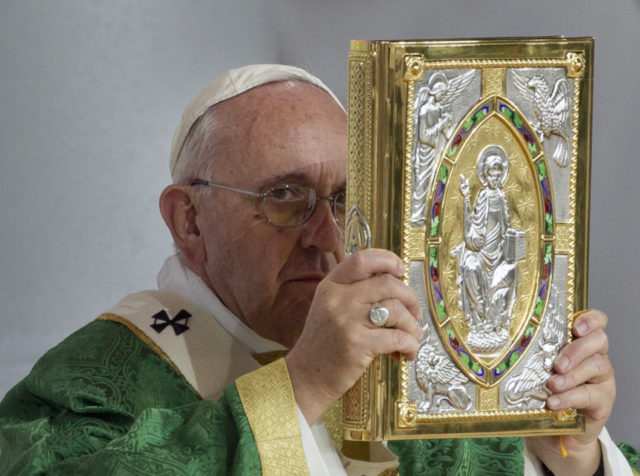The approval rating of Pope Francis declined all over Europe during the course of 2018, a new analysis observed Wednesday, in large part because of his ever-less popular pro-immigration stance and other globalist positions.
Among German Catholics, the pope’s popularity plummeted by a staggering 20 percentage points in one year, notes analyst Francesco Galietti, who runs the political risk consultancy Policy Sonar, and with Francis at its helm, the Catholic Church as a whole also suffered a drop of 9 percent in its approval rating among the same constituency.
In Italy, as well, support for the Argentine pontiff waned in 2018, Galietti observes, with surveys indicating that the pope’s approval rating fell by five percentage points over the course of the year, from 77 to 72 percent.
Francis’ decreasing popularity in Italy has been offset by growing popularity for the reigning populist, Eurosceptic government, and in particular its most charismatic member, interior minister Matteo Salvini.
While prelates and Church bodies have taken to demonizing Mr. Salvini for his determination to put a stop to Italy’s mass illegal immigration problem, more and more of the Catholic faithful have found themselves more closely aligned with Salvini than with their own shepherds.
One recent poll showed that fewer than one in five Italians (19 percent) would like the government to reopen the country’s closed ports to migrants, while only 12 percent of those surveyed said that it is the responsibility of individual states in whose territorial waters the migrant ships have arrived to resolve the situation.
The pope’s marked political character has heightened the willingness of Catholics to disagree with their pastors, Galietti notes, since the pontiff’s approximation to United Nations positions on global warming and international immigration can easily be brushed aside as simple leftist slogans with little if anything to do with the gospel of Jesus Christ.
Both in Italy and in Germany, Francis has paid the price of his “unqualified open-door policy toward migrants,” Galietti writes, which has created a “double problem” even among practicing Catholics.
On the one hand, it is subject to “excessive vagueness” that seems to ignore the real problems faced by real people, Galietti notes. And thus it is “no coincidence” that Salvini’s closure of Italian ports is the most convincing option among Italian Catholics, even who regularly attend mass, as recent surveys have shown.
On the other hand, “the politics of Pope Bergoglio is experienced as an attempt to void national identities,” Galietti states, as Francis continually insists on the priority of multinational bodies while pooh-poohing the populist, nationalist, and pro-sovereignty sentiments of many Catholics.
Curiously, this last fear spans the divide between Europhile countries (Germany) and Eurosceptics (Italy), Galietti writes, and even moderately conservative parties throughout Europe are now examining possible alliances with right-wing groups that would have been anathema just a few years ago.
It is evident that the multilateral system as a whole is “going through difficult times, with the re-emergence of nationalistic tendencies,” the pope warned a group of diplomats a week ago, as he put forward his conviction that globalist organizations are key to the maintenance of peace and international stability.
These nationalist tendencies “undermine the vocation of international organizations to be a space for dialogue and meeting for all countries,” he said.
All in all, Galietti suggests, the pope’s declining popularity is a side-effect of having hitched his horse to globalist political platforms and supranational formations, which to many Europeans is looking more like the past than the future.
Follow Thomas D. Williams on Twitter Follow @tdwilliamsrome

COMMENTS
Please let us know if you're having issues with commenting.